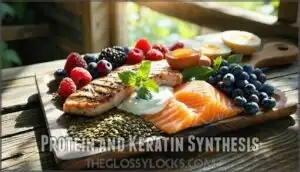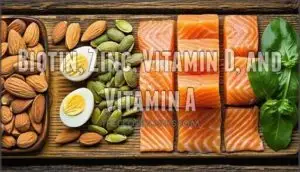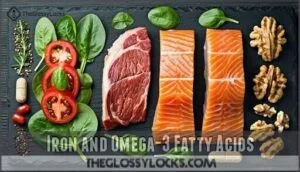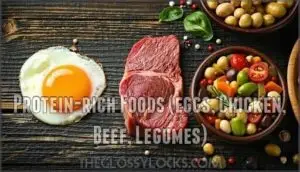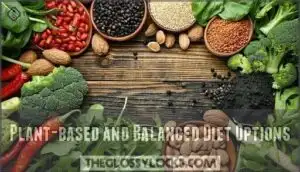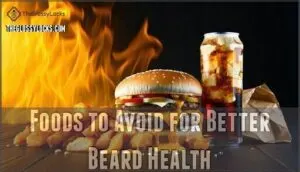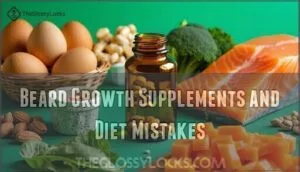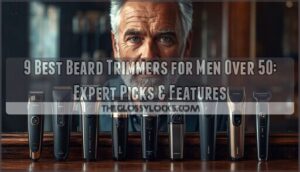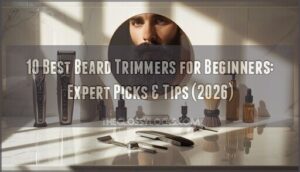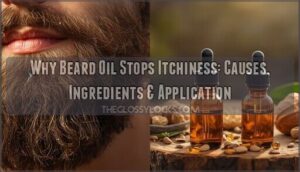This site is supported by our readers. We may earn a commission, at no cost to you, if you purchase through links.
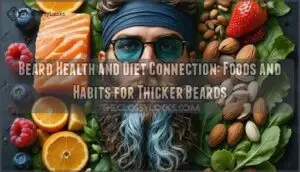
Think of your beard as a construction project: without the right materials (vitamins A, D, E), the job gets sloppy. Processed foods and poor hydration sabotage progress, while protein-rich meals fuel thickness.
The secret lies in understanding which specific foods transform facial fuzz into a striking mane.
Table Of Contents
Key Takeaways
- You’ll build stronger beard hair by eating protein-rich foods like eggs, chicken, and legumes, since they provide the amino acids needed for keratin production and thicker growth.
- Your beard needs specific vitamins and minerals to thrive—biotin prevents brittleness, zinc repairs follicles, iron delivers oxygen to hair roots, and vitamins A, D, and E support healthy growth patterns.
- You’re sabotaging your beard when you eat processed foods and skip hydration, because these dietary mistakes cause weak, patchy growth and dry, brittle facial hair that breaks easily.
- You can’t rely on supplements alone if your overall diet is poor—beard growth vitamins work best when they’re filling actual nutritional gaps, not trying to override bad eating habits or genetic limitations.
How Diet Influences Beard Health
What you eat plays a direct role in how your beard grows and looks, turning your kitchen into your secret beard lab. If you’ve ever wondered why your beard seems thin after living on instant noodles, science points to nutrients like protein, iron, and vitamins as the real growth drivers.
Nutritional Science Behind Facial Hair Growth
Thinking about thicker facial hair? Picture each beard follicle as a tiny factory. These factories need healthy Beard Growth Diet parts—dietary protein and essential nutrients for beard growth—to work right.
If you’re skimping on healthy beard foods, micronutrient deficiencies or hormonal growth factors can slow you down, no matter your genetic predispositions. Nutrition matters more than magic oils.
Key Nutrients for Beard Thickness and Strength
A healthy beard isn’t just a product of genetics—it’s about the right Beard Growth Diet. Protein Synthesis and Keratin Production get a boost from quality protein for beard growth.
Don’t skimp on vitamins for beard growth or minerals; Vitamin Deficiencies and poor Mineral Absorption tank results. A balanced diet fosters healthier hair follicles.
Don’t forget Fatty Acids and zinc for beard growth—your secret beard allies!
Common Diet-related Beard Problems
You might follow a Beard Growth Diet loaded with Healthy Beard Foods, yet a few Dietary Mistakes can still sneak in.
Skipping protein can lead to Weak Hairs or a Patchy Beard, while not eating enough iron means Slow Growth and Beard Thinning.
Not staying hydrated? That’s a recipe for Dryness & Itch—definitely not great for Beard Health.
Essential Nutrients for Optimal Beard Growth
You’ll get a fuller, healthier beard when you fuel your body with the right nutrients, like protein, biotin, and iron.
Forget beard myths—science shows that what’s on your plate can shape what grows on your face, even if you can’t blame last night’s pizza for a patchy chin.
Protein and Keratin Synthesis
For beard growth, protein and Keratin Production are your foundation. A strong Beard Growth Diet featuring Protein Sources keeps your Amino Acids in check and boosts Synthesis Rate.
For a healthier, thicker beard, focus on:
- Lean meats and eggs
- Greek yogurt
- Lentils and beans
- Consistent, balanced Dietary Impact
Feed your beard.
Biotin, Zinc, Vitamin D, and Vitamin A
Grabbing a bag of almonds or sitting in the sun can do wonders, seriously. Biotin, Zinc, Vitamin D, and Vitamin A each play a unique part in beard growth, from fighting Biotin Deficiency to perfecting Supplement Dosage. To make certain you have healthy follicles, consider how vitamin A is vital for beard growth.
Here’s what they do:
| Nutrient | Key Benefit | Top Source |
|---|---|---|
| Biotin | Prevents brittleness | Eggs, almonds |
| Zinc | Follicle repair | Pumpkin seeds |
| Vitamin D | Shaft thickness | Sun, fatty fish |
Iron and Omega-3 Fatty Acids
Although you can sprout a solid beard with good genes, neglecting iron and omega-3 fatty acids is like planting seeds in bad soil. Low iron absorption leads to anemia impact—think weak, patchy growth. Omega-3 benefits include inflammation reduction.
Stock up on healthy beard foods: spinach, red meat, fish, walnuts—prime foods for beard growth and lasting nutrition.
Best Foods for a Healthy Beard
If you want a beard that’s thick and healthy, what you eat really matters—no magic beans required. Choosing the right foods packs your plate with the nutrients your facial hair needs, so your beard won’t leave you hanging at awkward patchy stages.
What you eat directly shapes your beard’s health and thickness—no magic beans required, just the right nutrients on your plate
Protein-rich Foods (eggs, Chicken, Beef, Legumes)
Strong beard growth needs solid protein sources in your diet. Eggs, chicken, beef, and legumes pack a punch—they’re loaded with dietary protein and amino acids your body uses for muscle building and thicker beards.
Think of these healthy beard foods as fuel for your face. Stick to protein-rich foods, and you’ll see better beard thickness over time.
Plant-based and Balanced Diet Options
Building a beard-friendly diet isn’t only for meat lovers. Anyone can foster healthy whiskers with a balanced meal plan rich in plant-based proteins, beans, lentils, and quinoa.
A plantbased diet offers plenty of vitamins for beard growth. Looking for supplement alternatives? Just add nuts and leafy greens—your Vegan Beard Growth and Vegetarian Beard Diets will thank you.
Foods to Avoid for Better Beard Health
Processed foods, sugary snacks, and even your trusty caffeine fix—these can sabotage your beard. Sugary drinks and dietary mistakes like excessive alcohol dry out facial hair, while inflammatory oils and allergen culprits cause trouble underneath.
Skip the salt trap and swap processed foods for real nourishment. Your beard will thank you, even if your sweet tooth doesn’t.
Lifestyle Habits That Impact Beard Growth
Your daily habits have more influence on your beard than you might think—even hitting the snooze button can make a surprising difference. By focusing on sleep, stress, and staying active, you’ll give your facial hair its best shot at looking fuller, no miracle lotions required.
Exercise and Testosterone Levels
When you push through a workout, your body pumps out more testosterone—the main driver for beard growth. Muscle mass gains from weightlifting make you a natural candidate for “testosterone boosters.”
Mix up exercise types—cardio and weights—for higher workout intensity. Just remember, razor-sharp gains come from steady routines, not overnight heroics, and a balanced diet always wins.
Sleep Quality and Beard Growth
A good night’s sleep is more than beauty rest—your beard relies on it too. During REM cycles, testosterone levels peak, fueling growth. Insomnia and sleep restriction, or issues like sleep apnea, can slow things down.
Melatonin’s role here is key: a settled sleep cycle isn’t just healthy lifestyle advice—it’s one of the trickiest beard growth factors.
Managing Stress and Environmental Factors
You’ve tucked in an extra hour of sleep, but stress and beard problems still linger? Life’s little curveballs—like seasonal changes and climate impact—mess with your whiskers more than a stubborn cowlick.
Try these to keep things in check:
- Limit sun exposure
- Skip smoking
- Manage environmental pollutants
- Maintain healthy lifestyle habits
Better beard days ahead!
Beard Growth Supplements and Diet Mistakes
You might think popping a beard supplement will instantly give you a lumberjack-worthy beard, but supplements work best when your diet isn’t sabotaging your facial hair goals.
Restrictive diets and common nutritional mistakes can turn even the best supplements into expensive placebos, making it important to understand what actually fosters beard growth.
Choosing Effective Beard Growth Vitamins
When shopping for beard growth vitamins, you’ll want to look beyond flashy marketing claims. Focus on brand reputation and dosage guidelines that align with recommended daily allowances. Quality supplements combine biotin and beard growth essentials like zinc, vitamin C, and iron. Set realistic expectations—beard growth supplements work best when correcting actual deficiencies, not overriding genetics.
Consider supplement interactions with medications and prioritize vitamin absorption by taking them with food.
| Key Ingredient | Benefits for Beard Growth |
|---|---|
| Biotin | Strengthens hair, aids keratin production |
| Zinc | Repairs hair tissue, regulates oil glands |
| Vitamin E | Improves blood flow to follicles |
Risks of Restrictive or Fad Diets
Despite their popularity, restrictive or fad diets create a perfect storm for beard problems. These dietary mistakes strip away essential nutrients like biotin, zinc, and healthy fats, triggering nutrient deficiencies that cause hair thinning and slow growth.
Your beard needs a wellrounded diet to thrive—crash diets increase hair loss risk and create beard patchiness through diet imbalance.
When to Consider Supplements for Beard Health
Several situations call for supplements to aid beard growth nutrition. You’ll want vitamins for beard growth if you’re consistently eating poorly, have underlying deficiencies, or notice persistent patchy growth despite good habits.
- Supplement timing matters – take biotin and beard growth vitamins with meals for better absorption
- Dosage considerations include zinc for beard growth at 11mg daily maximum to avoid toxicity
- Supplement interactions can occur, so consult healthcare providers before combining multiple products
- Realistic expectations mean waiting 3-6 months to see noticeable improvements in thickness
Frequently Asked Questions (FAQs)
Can seasonal changes affect beard growth rates?
Like medieval knights tracking seasons by their armor’s rust, you’ll notice your beard grows faster during summer months. Research shows beard growth peaks in July, reaching 60% above winter levels, thanks to higher testosterone.
Do beard growth patterns differ by ethnicity?
Yes, ethnicity greatly influences your beard growth patterns. Men of Mediterranean descent often grow denser beards, while East Asian men often experience lighter facial hair growth concentrated around the mouth area.
How does hydration impact facial hair quality?
Proper hydration keeps your facial hair strong since beard hair is about 25% water. Water transports nutrients to hair follicles, promoting healthier growth and reducing breakage.
You’ll notice softer, shinier whiskers when you’re drinking enough.
What role does gut health play in beard development?
Your gut’s like your beard’s silent business partner—healthy gut bacteria help synthesize essential nutrients and reduce inflammation, delivering the building blocks your follicles need for thick growth.
Are there specific meal timing strategies for beard growth?
Timing your meals throughout the day doesn’t greatly impact beard growth. Consistent nutrition with adequate protein, vitamins, and healthy fats matters more than when you eat.
Conclusion
Dramatically transforming your patchy facial hair into a striking mane isn’t magic—it’s science. The beard health and diet connection proves that proper nutrition directly impacts growth quality.
You’ve learned that protein builds keratin, biotin prevents brittleness, and zinc repairs follicles. Skip processed foods, prioritize lean meats, eggs, and leafy greens. Remember: your beard reflects what you eat.
Combine smart nutrition with quality sleep and exercise, and you’ll see considerable improvements in thickness and strength within months.
- https://cremocompany.com/blogs/blog/how-to-grow-your-beard-faster
- https://pmc.ncbi.nlm.nih.gov/articles/PMC9650738/
- https://madvikingbeard.com/blogs/the-viking-blog/what-foods-help-hair-growth
- https://www.beardorganics.com/blogs/beard-blog/what-vitamins-help-beard-growth
- https://thebeardclub.com/blogs/beard-culture/which-essential-vitamins-help-your-beard-grow

